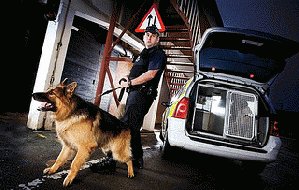reprinted from Dailykos.com by 8ackgr0und N015e
About a year and a half ago, a group of Nevada State Troopers,
along with a retired police sergeant filed
a racketeering lawsuit against the
Nevada Highway Patrol. The
allegations are shocking. However, they are
not surprising -- at least to me.
The complaint alleges that after then-Gov. Jim Gibbons approved a K-9 program to target drug runners on Nevada's highways, Nevada Highway Patrol Commander Chris Perry intentionally undermined the program.Read the Complaint Here (Warning: PDF)The complaint alleges that the drug-sniffing dogs used by troopers in the program were intentionally being trained to operate as so-called trick ponies, or dogs that provide officers false alerts for the presence of drugs.
The dogs were being trained to alert their handlers by cues, instead of by picking up a drug's scent by sniffing, the complaint said. When a dog gives a false alert, this resulted in illegal searches and seizures, including money and property, the complaint said.
The 103-page complaint alleges that Perry, along with others, used the K-9s to undermine the program to systematically conduct illegal searches and seizures for financial benefit.
This appears to be more than a local problem.
A study done by a team of researchers at UC Davis testing the reliability of drug- and bomb-sniffing dogs found an 85 percent failure rate:
Click Here to Read Whole Article
This problem is not limited to any particular geographic area. And now the cops have gotten even bolder. No longer do they pretend to have probable cause. They have gone so far that even Justice Scalia (and his ever-faithful lapdog, Thomas) felt compelled to side with the majority and limit the police powers in a recent case out of Florida, (Florida v. Jardines). In that case, the cops had their dogs walk around on people's porches and then used that to justify a warrantless search of the premises.
Here is what happened:
(Note: You can view every article as one long page if you sign up as an Advocate Member, or higher).





